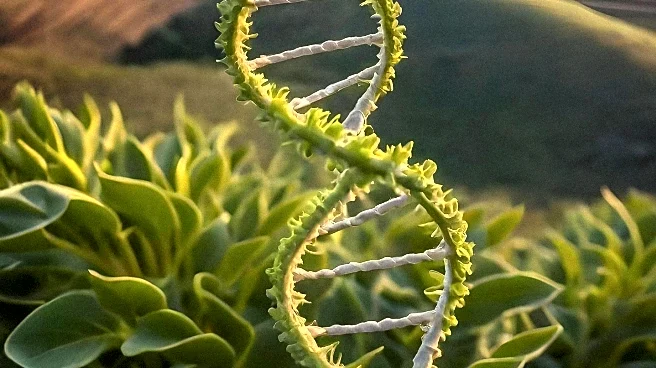What's Happening?
Recent research has highlighted the potential of Zuogui Wan (ZGW), a traditional Chinese medicine, in treating oligoasthenozoospermia, a condition characterized by low sperm count and motility. The study
utilized network pharmacology, molecular docking, and experimental validation to explore the therapeutic effects of ZGW. Key bioactive compounds such as Cyasterone, Betavulgarin, Kaempferol, and Quercetin were identified, with Cyasterone showing the strongest binding affinity. In vitro experiments demonstrated that ZGW significantly promotes cell proliferation and regulates apoptosis-related gene expression, enhancing sperm function. The study confirmed that ZGW activates proteins like NF-κB and PKC, which are crucial for spermatogenic cell survival and proliferation.
Why It's Important?
The findings are significant as they offer a potential alternative treatment for oligoasthenozoospermia, a condition that affects male fertility and has limited treatment options. By identifying the molecular pathways and compounds involved, this research provides a scientific basis for the use of traditional Chinese medicine in modern healthcare. The activation of key proteins by ZGW could lead to improved sperm quality and motility, offering hope to individuals affected by this condition. This development could also encourage further research into the integration of traditional and modern medicine, potentially leading to new therapeutic strategies.
What's Next?
Future research may focus on clinical trials to validate the efficacy and safety of ZGW in human subjects. Additionally, further studies could explore the potential of combining ZGW with other treatments to enhance its therapeutic effects. The integration of traditional Chinese medicine into mainstream healthcare could also be examined, potentially leading to broader acceptance and application of such treatments in Western medicine.
Beyond the Headlines
The study underscores the importance of understanding traditional medicine through a scientific lens, which could bridge cultural and medical practices. It also highlights the potential for traditional remedies to address modern health challenges, promoting a more holistic approach to healthcare. The ethical implications of integrating traditional medicine into modern healthcare systems, including issues of intellectual property and cultural appropriation, may also be explored.









